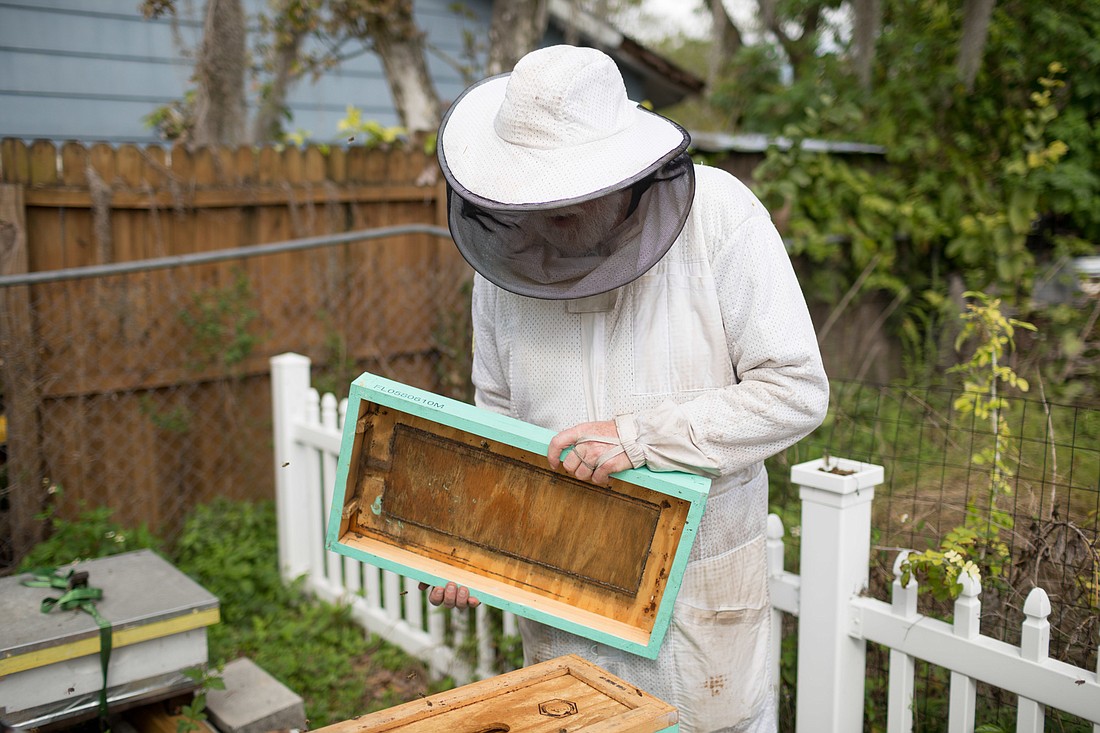- December 21, 2024
-
-
Loading

Loading

I’ve never really felt one way or the other about bees.
Like most people, when one flies near, I run away in fear of getting stung and often look like a fool. I also know, though, that they are incredibly important to our environment.
So, when the opportunity arose to don a bee suit and work on a hive, I did what any respectable journalist would do. I did it.
On Feb. 21, another reporter and I knocked on local beekeeper Tom Mawn’s front door. He gave us white bee suits, and we headed to one of the six local host-a-hive apiaries he manages.
In 1999, Mawn moved into his Lido Shores home and almost immediately began gardening. After a few years, the garden wasn’t producing as he liked, so he thought bees would help increase the output.
He talked to those involved with the local beekeeping association and shadowed a local beekeeper. As his garden has improved over the past five years, he has become completely fascinated with bees, he said.
Mawn, 63, is now a Florida-state certified beekeeper. He also participated in the master beekeeping program through the University of Florida.
“I wish people understood how critically important bees are to us surviving on the planet the way we like to,” he said. “The bees pollinate approximately one-third of the crops that we eat, and a lot of the fruit you enjoy, a lot of the vegetables that you enjoy, really rely on honey bees to pollinate them, and without them it would be really difficult.”
When people find a hive on their property, they do one of two things, Mawn said. They either call for pest control to destroy it or call a beekeeper who can move the hive to an environment where it’s wanted.
People can volunteer to have a hive put in their yard — an apiary — but not all yards and hives are perfect matches. Mawn compares it to taking in a feral cat.
“Sometimes it works beautifully and sometimes the cat doesn’t want to stay,” he said. “The same is true with bees, and I can remove them from one location and put them in what I consider a luxury apartment being a hive, and move it to a location where there is ample forage around, and they just won’t take to it. So, we have maybe a 50-50 chance of bees sticking around.”
There are three ways to collect bees. The first is in a swarm, which is just collecting a swarm of bees that are already searching for a new home. The second is a trapout, which blocks the bees from entering their hive and collects them in a bait hive.
The third rescue is called a cutout, which is what Mawn did for the hive we visited. A beekeeper will cut open the wall of wherever the hive is and use a special vacuum to safely collect the bees into a hive box. Once the bees are in the box, a beekeeper will cut out the original comb and put it in frames to keep it together and put it in the box where the bees relocated.
The day I met Mawn, we traveled to a home off Fruitville Road where a hive that had originally been on Longboat Key was now regrouping. When Mawn removes a hive for relocation, he makes sure the new location is at least five miles from its original home, so the bees don’t go back.
Our plan was to take the rescued colony from a nucleus hive box, the hive they lived in when Mawn moved them, to a regular hive box, which Mawn built from a kit.
However, upon arrival, we found that most of the bees were still sticking with their original home. So, we used a smoker to try to get some of them to move. Mawn filled the smoker with various leaves, and then it was my job to squeeze it every few seconds to keep it smoking.
I squeezed the smoker into the frame where the hive was, and though some bees moved, not many did.
“The smoker provides distraction so that the bees are concentrating on what they perceive is a threat of imminent danger from a forest fire rather than paying attention to the clumsy giants who are tearing their home apart,” Mawn said. “If the bees had more completely evacuated the comb that is inside the utility cover, I would have moved everything over to a regular-size hive.”
Mawn will continue to check the colony until it is ready to move to a new hive.
But don’t worry, when the bees evacuate they won’t abandon their colony.
“They will always come home,” Mawn said.
Mawn said that while host-a-hive apiaries have grown over the years, some people still don’t know about them.
“It helps them. It helps us,” Mawn said.
For information on how to host a hive, visit beepals.strikingly.com or email [email protected].